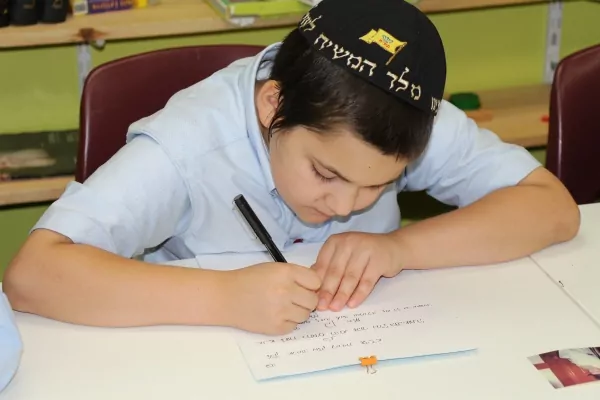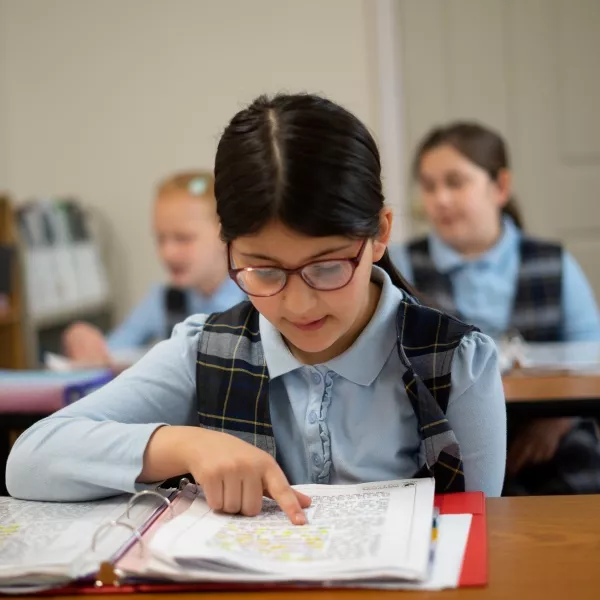Our Curriculum
Our school boasts a multidimensional and integrated curriculum based on authentic Torah values.
CONTENT
The OYYL curriculum follows the Rebbe’s directive that a Jewish child’s education should be “al taharas hakodesh.” Our students study a vast array of topics, including Chumash, Mishna, Gemara, Jewish History, Tefilah, basics of Tanya and Chassidus, and the rich history of Chabad Chassidus and its niggunim.


LAYERED CURRICULUM
OYYL uses a layered-style curriculum to ensure maximum academic success. This means that we do not facilitate a cookie-cutter type education; instead, each child is gradually growing at their pace. There are core requirements that students must meet at every stage of learning to graduate to the next step. Therefore, our students systematically advance in their studies as every new idea or skill they are taught builds on their previous knowledge.
Teachers are required to communicate across the grades to report on each child’s proficiency, thereby ensuring that each child completes all the material over their schooling years. This method grants our staff a flexible curriculum structure, enabling them to educate each child according to their capability.
INTEGRATED CURRICULUM
Regardless of the specific subject or activity, we provide students with an awareness of Hashem’s unity and tools to recognize His immanence in the world. Hashem’s presence is felt in the classroom environment, in the daily routine that includes Mitzvos, in the language used, and in the content of the curriculum that teaches nature as a wonder of Hashem’s making.


READING AND WRITING
Reading and writing are the essential tools for learning; therefore, attaining proficiency in these areas at an early age is vital. We place a strong emphasis on literacy skills. Our students are given the necessary decoding skills to independently understand a Hebrew or Aramaic text, so they do not need to be over-reliant on their teachers.
LEARNING TO THINK (EXPANDING COGNITION)
One of the core principles in Chabad’s philosophy is the importance of processing and internalizing knowledge and daily experiences; to be a Pnimi. Therefore, OYYL’s priority is to teach our students educational tools as opposed to focusing solely on knowledge gain. We believe that training a child to think critically, reflect on information, and relate it to their lives is the most crucial part of education.


OYYL is the only school in the US that promotes pure Chassidic education within an “open learning” classroom.
Whereas typical frontal learning focuses on standardizing the educational process and attaining homogeneity, “open learning” is a child-centric method that focuses on the individual student’s needs.
Therefore, our classes are small, with 12-14 students to facilitate this process. Additionally, instead of standing at the front of the classroom and lecturing to everyone at the same level, our teachers instruct their students individually or in small focus groups. These groups are based on the student’s abilities and pace of comprehension and the instructional methods that work best for them. Thus, we allow our students and teachers the utmost flexibility to be genuinely engaged in the process of learning. In addition, our child-centric approach allows our teachers the freedom to tailor-fit a suitable environment to stimulate student creativity.
Our approach also guarantees a nurturing and positive social structure between students. Since students work together in study groups, they foster a feeling of love and brotherhood. We encourage positive language and constructive behavior, thereby eliminating competitiveness and the possibility of bullying from the classroom environment.
Our student-friendly designed classrooms are colorful and bright with engaging furniture that is conducive for learning. Every component in our rooms is intended to promote a healthy and interactive classroom setting, from furniture size to placement. There are also numerous workstations for different activities, such as a place where students do desk work, a station where they can do individual work and finish their class work, a play area, and an art center. This way our students are engaged in various ways.
